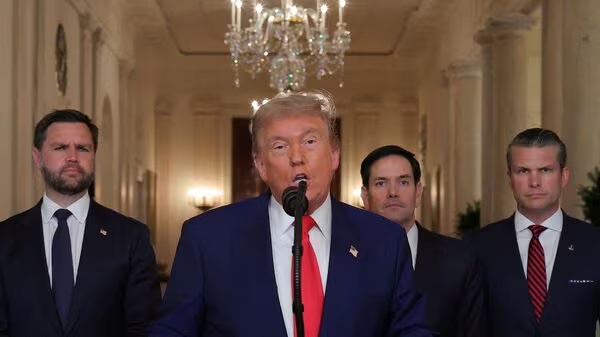
Who to Believe? Trump Says Iran’s Nukes “Obliterated” — U.S. Intel insists they’re “Alive and Kicking”
26 Jun 2025 • 5:30 PM MYT

TheRealNehruism
Writer. Seeker. Teacher

Image credit: Mint
U.S. President Donald Trump was so gung-ho about the impact of American strikes on Iranian nuclear sites that he compared them to the bombings of Hiroshima and Nagasaki, which ended World War II.
“I don’t want to use an example of Hiroshima, I don’t want to use an example of Nagasaki, but that was essentially the same thing. That ended that war. This ended the war,” Trump declared.
According to Trump, the American strike on Iran’s nuclear facilities was such a resounding success that Iran’s nuclear ambitions had been set back “basically decades, because I don’t think they’ll ever do it again.”
However, this bold assessment has been disputed by the U.S. Defense Intelligence Agency itself, which concluded that the strikes had only set back Iran’s nuclear program by a few months — a far cry from the “obliteration” claimed by Trump and his administration.
Although Trump and his officials have cast serious doubt on the veracity of the intelligence community’s assessment, the mere fact that U.S. defense intelligence is contradicting the President’s version of events raises a critical question: has the 12-day war between Iran and Israel really ended?
Trump insists it has, citing the ceasefire he personally brokered between the two nations — a deal he claims was made possible only because he had struck Iran from a position of strength, by destroying its nuclear capabilities.
But if his own intelligence agencies are suggesting that Iran’s nuclear program is still intact and operational, it severely undermines Trump’s narrative of triumph. His claim to having tamed Iran hinges entirely on the belief that its nuclear threat has been eliminated. Without that, the justification for peace — and the strength of the ceasefire — begins to crumble.
If the Defense Intelligence Agency's findings gain wider acceptance, the perception that Iran’s nuclear program is “alive and kicking” could jeopardize the fragile ceasefire. Should Israel strike Iran again, it could easily point to the American intelligence report as justification — arguing that the threat of a nuclear-armed Iran still looms, contrary to Trump’s claims.
And if Iran is attacked again, after Trump has already declared its nuclear program obliterated, he’ll face an uncomfortable dilemma: who should he blame for breaking the truce — Iran or Israel?
If he blames Israel, he risks endorsing Iran’s argument that Israel acted unjustly and aggressively. But if he blames Iran, he would effectively be admitting that he was wrong — that the American strike did not, in fact, succeed in eliminating Iran’s nuclear capabilities.
Personally, I predict that contrary to Trump’s claim of having ended the conflict, he may have actually stoked its embers. In the coming days, it seems likely that the way Trump is handling this conflict will come to be seen not as a masterstroke of international diplomacy, but as a chaotic and bewildering performance. Far from re-establishing order and showing the world who’s boss, Trump may increasingly be viewed as an incompetent clown — a figure placed by fate in the wrong moment of history, not to close the gates of war, but to throw them wide open and let in the horsemen of the apocalypse.
To be or...not to be, that isss the question...
ReplyDeletehttps://t.me/WeTheMedia/125537
JUST IN - Israel did not destroy all of Iran's highly enriched uranium. The U.S.-Israeli position is that Iran will be asked to "hand over that material," said Israel's Defense Minister, Katz.
https://www.disclose.tv/id/xfmxgc1az4/
@disclosetv
No need to waste time farting about inconsequential.
ReplyDeleteJust time check when can Iran declares a successful nuclear testing lah.
It would be a lough & farcical laugh if it happened during the Trump's reign!